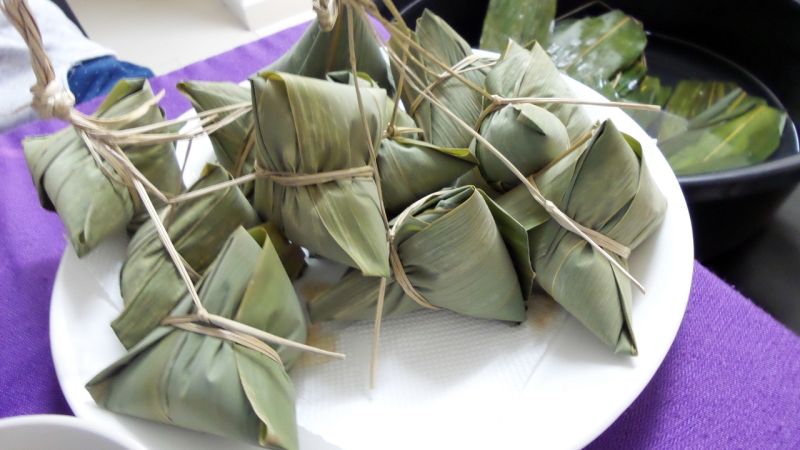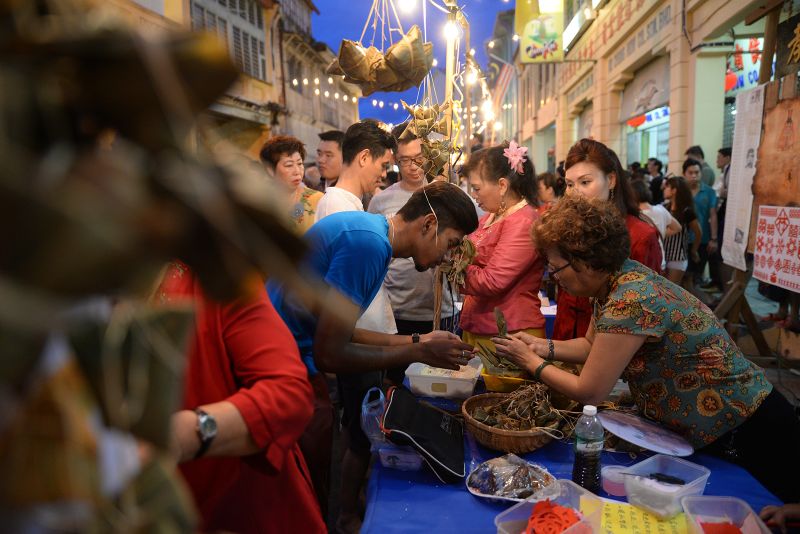PUTRAJAYA, June 7 — Siti Rafitah Rakhimi, 32, has been craving for the Chinese traditional delicacy Kuih Chang, also known as bak chang, that is mostly available during the Dragon Boat Festival or Duan Wu period, that falls in the middle of the year.
She had heard from her Chinese friends of the tantalizing taste of the Kuih Chang, that comes in pyramid shape wrapped with bamboo leaves and the filling is made of meat, legumes and salted egg.
However, she never got to taste one as she feared as it may not be permissible for Muslims as some of the ingredients used do not conform with the halal requirements.
Hence, Siti Rafitah decided to make the Kuih Chang herself so that it could be consumed by all. Moreover, the delicacy is not easily available as it is seasonal and mostly sold during the Duan Wu festival.
Two years ago, her strong desire to make one prompted her to study the Kuih Chang recipe through internet and make come changes in its content to ensure they are halal. She also learnt the art of wrapping the delicacy into the required shape through Youtube.
“The first batch of Kuih Chang did not turn out well as I did not wrap them tightly thus causing the content within to spill out while boiling.
“Yet, I tried many times based on the recipe from the internet and Youtube and gave the ones that I made to my Chinese friends to try them and get their feedback,” she said to Bernama.
Recipe to suit the customer's taste
Sharing her experience in preparing the Kuih Chang the halal way, the human resource officer with a private firm said the recipe available in the internet were mostly not halal.
“The Kuih Chang that are not halal use pork and lard to help make it buttery and soft but I changed it to chicken meat and oyster sauce.
“To make soft and tasty Kuih Chang, it is better to use the meat from the chicken thighs as there is more fats here and the meat is soft...if other portions are used the Kuih Chang may turn out hard as the meat dries up,” she explained further.

Normally, Siti Rafitah will prepare the ingredients like the glutinous rice, chicken meat, egg yolk, small shrimps, fried shallots and the bamboo leaves a day before wrapping and boiling the Kuih Chang.
“To make tasty Kuih Chang, I will fry the peanuts, the small shrimps and the onions until they are crisp instead of using the ready made ones as this makes the Kuih Chang more aromatic.
“Apart from that, the bamboo leaves used to wrap the Kuih Chang have to be soaked in brine overnight to soften them before they can be made use for wrapping,” she said.
The Kuih Chang’s taste is dependent on how the filling is prepared and the type of glutinous rice used.
“When comes to the glutinous rice, I choose the one ordered specially from Kedah as it is more fragrant and sticky.
“When the rice is sticky, the fillings get absorbed and they taste better after they are boiled,” she added.
Siti Rafitah will boil the Kuih Chang in batches of five for at least two and a half hours.
“The water level has to be above the Kuih Chang to ensure it is evenly cooked,” she said.
The Kuih Chang can be stored in a cool dry place for up to a week and in refrigerator for a month.
“If it is to be reheated before eating, just steam it for 30 minutes,” she said.
ORders for kuih chang during Ramadan
Initially, Siti Rafitah only wanted to make the Kuih Chang that were halal to get a taste of the delicacy and never imagined the changes she made in the recipe has created a demand for them.
“It never crossed my mind that I will be taking orders for Kuih Chang as I only wanted to taste for myself the delicacy.
“However, after taking into consideration her Chinese friends’ compliments that my Kuih Chang is delicious, I decided to take orders for them but only from those whom I know,” she said.

In conjunction with the Duan Wu that falls on June 9, Siti Rafitah has received orders for the delicacy from her Chinese friends including Chinese Muslims.
“During Ramadan, I also receive orders from Muslim friends with the delicacy served when breaking fast.
“Those who do not consume pork will order the Kuih Chang with chicken filling from me and may even make ‘special request’ like they want it less salty,” she said.
Orders have to be made before Fridays and she caters only up to 130 pieces.
“As I work in office from Monday to Friday, I only have the time to make the Kuih Chang after office hours and during weekends,” she said.
The Kuih Chang with chicken filling is priced RM4 per piece, but the price is also dependent on the requests made by customers.
“As for example, if they want chestnuts to be added to Kuih Chang, I will raise the price to RM4.50 as chestnuts are expensive,” she said.
Different races, different tastes
Through the orders for her Kuih Chang, she learnt about the different tastes of the different races.
“The Malays like their Kuih Chang to be saltier unlike the Chinese who prefer less salt but with more filling,” she said.
The tantalising Kuih Chang with chicken, mushroom and legume filling has bowled over the Malays who have tasted it.
“Initially they felt odd because for the Malays the glutinous rice is served with sweet fillings but Kuih Chang has meat fillings... As time went by they got used to the taste and liked the delicacy,” she said. — Bernama






















